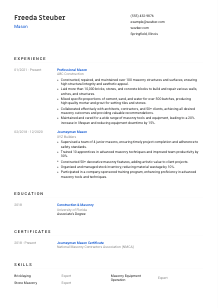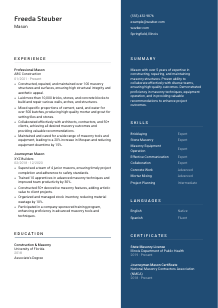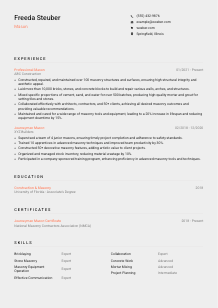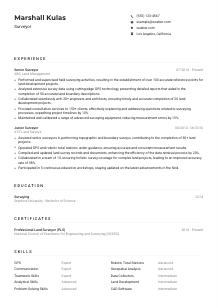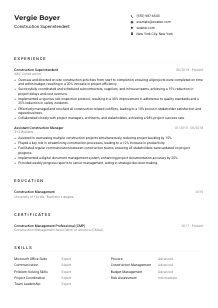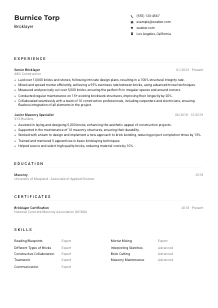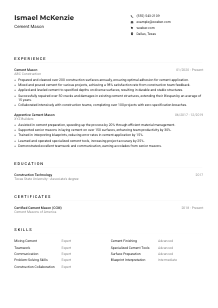Mason Resume Example
Layering bricks, but your resume feels like one big wall? Chip away at this Mason resume example, grouted with Wozber free resume builder. Discover how to cement your stonework skills to align with job foundations, building a career profile as solid as the structures you construct!
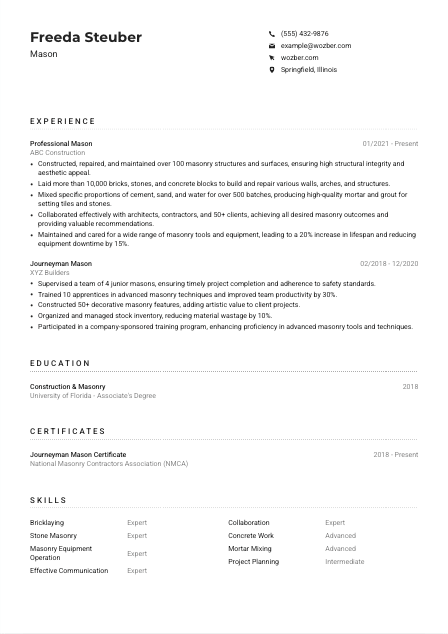
How to write a Mason Resume?
Hey there, aspiring mason! In the gritty world of masonry, where each brick you lay is a step towards crafting beauty and durability, your resume needs to be just as solid and enduring. Whether you're mixing mortar or laying stones with precision, this guide will help you chisel your resume into a masterpiece, tailored to the masonry position you're aiming for.
With Wozber free resume builder at your side, crafting an ATS-compliant resume that speaks directly to hiring managers is a breeze. Let's get those hands dusty in the best possible way - by securing that dream job as a Mason!
Personal Details
First impressions are critical, and in masonry, it all starts with laying a strong foundation. Your personal details are the cornerstone of your resume. Here's how to make sure they're set properly, making your introduction as impactful as a well-laid brick.
1. Nail Your Name
Your name is your brand, an emblem of your craftsmanship. Ensure it's prominently placed at the top of your resume, clear and steadfast, just like the structures you build.
2. Job Title Alignment
Masonry is all about alignment, and your resume should follow suit. "Mason" should be clearly stated below your name, instantly signaling your trade and expertise to the hiring manager.
3. Essential Contact Information
Make sure your contact details are as reliable as your work ethic. Include your most accessible phone number and a professional email address. Accurate and straightforward contact info ensures you're easy to reach for that job offer.
4. Geographic Precision
Just as the right stone must fit perfectly in its space, your location can be a pivotal detail. Indicate your city and state, especially if it aligns with the job's location requirement – in this case, "Springfield, Illinois."
5. Digital Footprint
In today's world, a digital presence can complement your physical craftsmanship. Include a LinkedIn profile or a personal website showcasing your projects, but only if it mirrors the professionalism of your resume.
Takeaway
Your Personal Details section is akin to laying the first stone with precision. It sets the tone, direction, and pace for the rest of your resume. Craft it with care, ensuring each piece fits perfectly into the larger structure of your career goals.





Experience
The strength of a wall lies in the experience of the mason. Your resume's Experience section is your chance to show the scope and depth of your craftsmanship. Let's dive into how to structure it, mimicking the job description for seamless ATS optimization.
- Constructed, repaired, and maintained over 100 masonry structures and surfaces, ensuring high structural integrity and aesthetic appeal.
- Laid more than 10,000 bricks, stones, and concrete blocks to build and repair various walls, arches, and structures.
- Mixed specific proportions of cement, sand, and water for over 500 batches, producing high‑quality mortar and grout for setting tiles and stones.
- Collaborated effectively with architects, contractors, and 50+ clients, achieving all desired masonry outcomes and providing valuable recommendations.
- Maintained and cared for a wide range of masonry tools and equipment, leading to a 20% increase in lifespan and reducing equipment downtime by 15%.
- Supervised a team of 4 junior masons, ensuring timely project completion and adherence to safety standards.
- Trained 10 apprentices in advanced masonry techniques and improved team productivity by 30%.
- Constructed 50+ decorative masonry features, adding artistic value to client projects.
- Organized and managed stock inventory, reducing material wastage by 10%.
- Participated in a company‑sponsored training program, enhancing proficiency in advanced masonry tools and techniques.
1. Scrutinize the Job Requirements
Begin by critically analyzing the job description, extracting key duties and preferred experience. This will serve as your blueprint for aligning your resume with what the hiring manager seeks.
2. Roles and Projects Highlight
Structure your experience in a chronological order, starting with your most recent positions. Articulate your roles clearly and detail signature projects that underscore your proficiency and impact as a mason.
3. Achievement-Centric Statements
Just as every brick you lay counts towards the integrity of the structure, every achievement listed should reflect your contributions. Highlight accomplishments with measurable outcomes, like "Laid over 10,000 bricks for various structures," to give tangible evidence of your expertise.
4. Quantify Your Impact
Numbers speak louder than words. Whether it's the square footage of stone laid or the percentage by which you reduced material waste, quantifying your achievements makes your impact concrete and palpable.
5. Relevance is Key
In masonry, as in your resume, everything has its place. Tailor your experience to align with the masonry skills and expertise the job requires, ensuring every line adds value and relevance to your application.
Takeaway
The Experience section is your opportunity to demonstrate the solidity of your craftsmanship. Think like a hiring manager, anticipating what would impress them the most. Tailor each achievement to highlight your masonry excellence. Let your experience narrate the story of your professional journey, brick by brick.
Education
In masonry, your hands-on experience is complemented by your foundational knowledge and continuous learning. The Education & Training section illuminates your academic background and any specialized training, reinforcing your qualifications.
1. Identify Educational Foundations
Your education serves as the bedrock of your expertise. Note any degrees, diplomas, or certifications that have prepared you for your masonry career, highlighting relevant studies such as Construction & Masonry.
2. Clear Structure
Organize this section for easy reading. Start with your highest degree or most relevant certification, followed by the institution's name and your graduation year. This straightforward approach lets your educational achievements stand solid.
3. Tailored Degree Details
If your education directly aligns with the job's requirements, make it prominent. For instance, an "Associate's Degree in Construction & Masonry" directly correlates with the professional foundation expected for a Mason.
4. Highlight Relevant Courses
For budding masons, or if your role requires knowledge of specialized techniques, listing pertinent courses can cement your expertise in the minds of hiring managers. This could include hands-on workshops or technical training.
5. Additional Educational Achievements
Masonry isn't just about laying bricks; it's a craft requiring continuous improvement. Include any accolades, memberships, or continuous learning experiences that showcase your commitment to your craft.
Takeaway
Your educational background does more than fulfill a requirement; it lays the foundation for your expertise as a mason. Ensure it reflects the depth of your knowledge and your dedication to the craft. Your education and training are crucial components of your professional identity, setting you apart as a candidate of choice.
Certificates
In the world of masonry, certain stones signify more than others. Similarly, specific certifications and licenses act as keystones in your resume, validating your skills and commitment to the profession.
1. Align with Job Necessities
Refer back to the job description to identify must-have certifications or licenses, such as a "Journeyman Mason Certificate" or a "State Masonry License." Aligning with these requirements showcases your eligibility and dedication.
2. Selective Showcase
Prioritize certificates that underscore your expertise in masonry over a broad list. This focused approach ensures hiring managers immediately see your most relevant qualifications.
3. Transparency with Timelines
Validity matters in both your constructions and certifications. If your licenses have an expiration date or if recent achievements boost your profile, include these dates to underscore your current expertise.
4. Keep Skills Sharp
Masonry, like all trades, evolves. Pursue ongoing education and certifications that keep your skills fresh and aligned with industry standards. This commitment to growth reflects well on your passion for the craft.
Takeaway
Consider your certifications and licenses as the seal on your professional brand. They authenticate your skills and readiness for the job, acting as a guarantee of quality. Present them proudly, ensuring they're up to date and relevant, to solidify your credibility as a top-tier mason.
Skills
In masonry, every tool in your belt and skill in your repertoire plays a crucial role in the construction process. The Skills section of your resume is your chance to showcase the specialized tools and techniques that you've mastered.
1. Extract Essential Skills
Dive into the job description to find both the hard skills and soft skills the employer values. From "Bricklaying" and "Stone Masonry" to "Effective Communication" and "Collaboration," these are the ingredients of your professional prowess.
2. Highlight Relevant Expertise
Your skills are your craft's signature. List those that match the job's requirements, ensuring you paint a complete picture of your capabilities. Focus on those that set you apart as a mason – your proficiency with specific materials and techniques can be a decisive factor.
3. Organized Display
An well-organized Skills section is like a well-laid brick wall – each part supports the next. Categorize your skills into 'hard' and 'soft' categories, and order them from most to least relevant to the mason position you're targeting.
Takeaway
Your Skills section is the blueprint of your professional identity as a mason. It's where you get to shine, showcasing the depth and breadth of your expertise. Choose each skill with intention, aligning with the job requirements to build a compelling case for why you're the right mason for the job.
Languages
While masonry is a craft communicated through the language of stone and mortar, your ability to articulate and understand different human languages can be a valuable asset, especially in diverse communities or projects.
1. Job Language Requirement
Notice if the job posting highlights any language requirements or preferences. For our mason position, "Ability to communicate in English is required." This necessity directly informs how you list your language skills.
2. Prioritize Required Languages
If specific languages are mentioned in the job description, ensure these are listed first on your resume, with an honest assessment of your fluency level.
3. Include Additional Languages
Beyond the basics, listing other languages you're proficient in can be a mark of versatility, demonstrating your ability to navigate diverse work environments or interact with a broader range of clients.
4. Honesty in Proficiency
Accuracy in representing your language proficiency is crucial. Employ clear terms such as 'Native,' 'Fluent,' 'Intermediate,' or 'Basic' to describe your level of comprehension and communication.
5. Assess Role's Linguistic Scope
Consider the broader scope of the masonry role. If it involves coordination with teams from different linguistic backgrounds or projects in multicultural settings, highlighting your linguistic dexterity could be particularly advantageous.
Takeaway
Your language skills can be the mortar that helps bridge communication gaps on complex projects. Showcase them with pride, recognizing them as part of the diverse toolkit that enhances your value as a mason. Your ability to communicate in more than one language is a testament to your adaptability and readiness for varied work environments.
Summary
Just as a keystone holds an arch in place, your summary holds together the narrative of your resume. This section is your chance to concisely communicate the essence of your masonry expertise and passion.
1. Capture the Job's Core
Start by internalizing the job description. Understand the essence of the role you're aiming for and reflect that understanding back in your summary, highlighting your relevant experience and skills.
2. Powerful Opening
Introduce yourself as a skilled mason with a strong opening statement. For example, "Mason with over 5 years of expertise in constructing, repairing, and maintaining masonry structures." This paints a vivid picture of your experience level and areas of expertise.
3. Match with Key Requirements
Incorporate a brief overview of your most relevant skills and accomplishments. Guide the hiring manager's attention to the proof points that you not only meet but exceed the job's requirements.
4. Conciseness is Key
Your summary should be a tightly constructed archway, not a sprawling wall. Aim for 3-5 potent lines that encapsulate your qualifications and enthusiasm for the role of a mason.
Takeaway
Think of your professional summary as the facade of a building – it sets expectations and draws interest. Craft it with the same attention to detail and pride you bring to your masonry work, making it an irresistible invitation to delve deeper into your resume.
Constructing Your Future
Congratulations on laying the groundwork for a standout mason resume. With these insights and Wozber's free resume builder, including the ATS-compliant resume templates and ATS resume scanner for optimizing your keywords, you're well-equipped to build your resume with the precision of a skilled craftsman. Remember, your resume is the scaffold of your professional persona, and now, it's set to elevate you towards your next project. Dust off that trowel, it's time to let your skills and this resume pave your way to new opportunities.

- Minimum of 3 years of experience as a professional mason.
- Proficiency in working with materials such as brick, stone, and concrete.
- Strong understanding of masonry techniques, tools, and equipment.
- Effective communication and interpersonal skills.
- Possession of relevant certifications or licenses, such as a Journeyman Mason Certificate or State Masonry License, where applicable.
- Ability to communicate in English is required.
- Must be located in or willing to relocate to Springfield, Illinois.
- Construct, repair, and maintain masonry structures and surfaces ensuring they are structurally sound and aesthetically pleasing.
- Lay bricks, stone, or concrete blocks to build or repair walls, arches, and other structures.
- Mix specific proportions of cement, sand, and water to create mortar or grout for setting tiles or stones.
- Collaborate with architects, contractors, and clients to achieve desired masonry outcomes and provide recommendations on materials and techniques.
- Maintain and care for masonry tools and equipment, reporting any damages or need for replacements.





